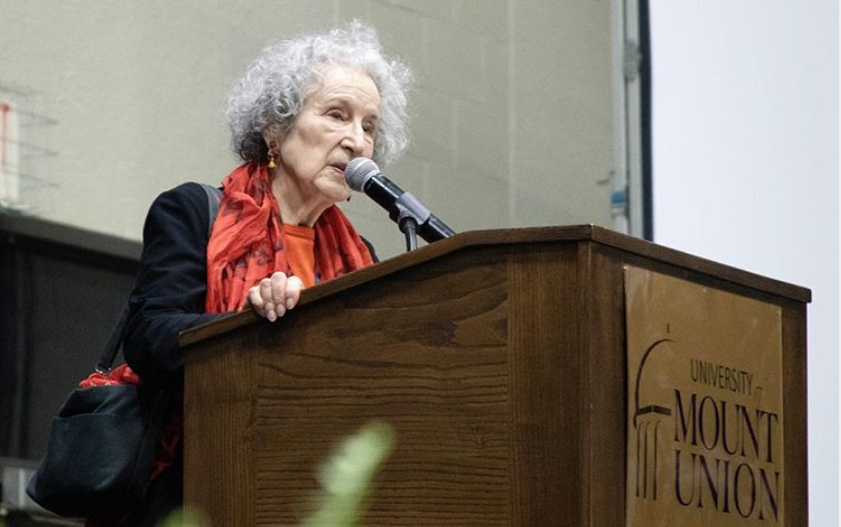Author Atwood Provides Insight, Entertainment at 2019 Schooler Lecture
April 11, 2019ALLIANCE, Ohio — When Mount Union President Dick Merriman introduced author Margaret Atwood as the featured speaker for the 2019 Schooler Lecture, he mentioned the historic lineup of previous presenters, the likes of whom include Desmond Tutu, Gerald Ford, Sandra Day O’Connor and Kareem Abdul-Jabbar.
When Atwood strolled to the podium, she began by stating, “I don’t think I’m in that league, and I am definitely shorter, too.”
This set the precedent for a night that featured a tonal balance of humorous, dry wit and certain harsh realities brought forth by society and her literary works to a room of nearly 2,500 University of Mount Union students, alumni and members of the Alliance and surrounding communities.
Upon recounting childhood stories growing up in Nova Scotia, Atwood led the evening with the motto that hung over her own college residence.
“The truth will set you free. But sometimes, the truth will get you in trouble, in prison, or even murdered,” she said.
As that quote may infer, Atwood initially wanted to call her talk, “Dollops of Gloom,” yet changed the presentation to “Rays of Hope,” as she cited ideals that were more positive in nature.
Atwood spent the evening focusing on two of her works: Oryx and Crake, the first book in the MadAddam trilogy, and The Handmaid’s Tale.
She described Oryx and Crake as a naturalist book discussing nature and how humans are destroying it asserting, “When a story clamors with such insistence, you can’t stall it!”

Margaret Atwood | Photo Courtesy Kristen Beck, Junifoto
Atwood denoted that the world can be worrisome at times right now, and Oryx and Crake asks the questions, “What if we continue down the road we’re already on? How slippery is the slope? What are our saving graces and who has the will to stop us?”
As a pensive hush fell over the crowd in the Timken Gymnasium, it immediately turned into laughter when Atwood did not skip a beat in her synopsis of the book.
“It is a jolly, fun-filled romp in which the entire human race has been annihilated, but there is a ray of hope,” she said. The series is currently being adapted into a television series from Paramount TV and Anonymous Content with a release date yet to be announced.
Atwood then segued into her most popular work to date, The Handmaid’s Tale, and spoke about how her time in West Berlin and traveling throughout Europe in the 1980’s inspired much of her writing in that novel.
“In coming to consciousness during World War II, I grew up in a world where anything could happen anywhere given appropriate circumstances,” she said.
She stated that the novel, with the setting of Gilead based on traditional Puritan roots, is speculative fiction as opposed to science fiction because, “I would not put any events into the book that did not already happen nor any feature any technology that wasn’t already available. God is in the details and so is the devil.”
The book has been translated in more than 40 languages and has been adapted into an opera, ballet, graphic novel and Emmy-winning television show on Hulu, which has garnered cultural and critical praise for its first two seasons.
Like the thematic elements in her books, Atwood did not stray from letting her fact-based opinions make an impression on the audience.
“Women are interesting and important in the books because women are interesting an important in real life,” she emphatically said to a rousing congruence of cheers and applause.
She concluded the prepared portion of her talk in an introspective fashion, mentioning that she is focusing on climate issues right now despite her age, stating tongue-in-cheek, “I’m focusing on ways to properly decompose my body without any plastics involved.”
Despite questions from students in the invitation-only question and answer prior to the lecture and from those in the audience at the event, Atwood would not divulge any spoilers for her upcoming sequel to The Handmaid’s Tale, The Testaments, due this fall.
A final question from a student writer sought advice from Atwood, and the speaker ended the night with advice that can be translated across all media.
“Fail. Fail harder. It’s how you learn.”